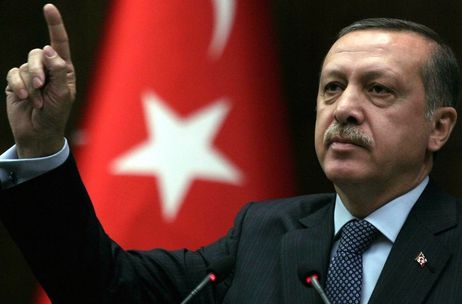Turkish and U.S. forces will train 2,000 moderate Syrian rebel fighters at a base in the central Turkish city of Kirsehir as part of the campaign against Islamic State insurgents, a Turkish Foreign Ministry official said on Monday. US Vice-President Joe Biden and Turkish President Recep Tayyip Erdogan discussed two days ago ways to defeat Islamic State and strengthen the Syrian opposition. Mr Biden, who was in Turkey for talks, said they discussed how to pursue a “political transition” in Syria. The US wants a bigger Turkish role in the fight against IS, but Turkey wants this linked with plans to remove Syrian President Bashar al-Assad. Mr Biden also praised Turkey’s role in supporting Syrian refugees. Speaking at the joint press conference after the meeting. Mr Biden said that they had discussed the crises in Iraq and Syria in “considerable detail”. “We spoke about our work as part of an international coalition to degrade and eventually defeat Daesh,” he said, using an Arabic name for Islamic State. He added that they had discussed a range of issues in Syria, including the need to deny Islamic State “a safe haven” and “strengthen the Syrian opposition and pursue a political transition away from the Assad regime.” Former U.S. ambassador to Syria, Robert Ford said earlier that U.S. airstrikes targeting the ISIL have helped Syrian President Bashar Assad’s regime, during a meeting at the House of Representatives Foreign Affairs Committee on Wednesday. “The airstrike campaign which we started in September has actually hurt the moderate opposition. It has discredited them on the street, because our strike targeted territory taken by the Al-Qaida affiliated Nusra Front which has been fighting against the Assad regime”, former ambassador said. “ISIL units were not fighting the moderate opposition, they were fighting the Assad regime. In fact, what we did is we played the role of the Assad air force,” Ford said. He also said “the American airstrikes in Syria hit elements of the al Qaeda-affiliated Jabhat al-Nusra in the northwestern part of the country, which caused them to retaliate against the moderate rebels, who were largely unprepared to deal with such attacks and fled. We didn’t warn the moderate fighters about our strategy and what it could encompass, so they were surprised and unprepared for the air attacks and the Nusra Front response. We should have explained our strategy to Syrian rebels. If it continues like this, there isn’t going to be a moderate opposition in northern Syria. It doesn’t have to be a choice between Assad and jihadi crazies in Syria, there is a third way, then I can imagine moving forward along the lines [of a political solution]. But in order to do that you have to have a little more pressure on the regime. We need more pressure on the ground.” Moreover, Chuck Hagel, US Secretary of Defense, said that the Assad regime is indirectly benefiting form the strikes launched by the international coalition against ISIS. Hadi al-Bahra, president of the Syrian Coalition, said earlier that the Syrian people feel there is a hidden agenda and cooperation between the coalition and Assad’s forces because Assad assumes he has a free hand,” he said. “Syrian public opinion is a front which we need to win.” He also said that defeating ISIS requires the elimination of its root cause, namely the Assad regime which created the ideal environment for ISIS to flourish. “We should not forget that the FSA has very early sensed the danger of ISIS and has taken the decision to fight this extremist group without consulting with the international community,” Bahra said. He also stresses that “the air strikes carried out by the US-led coalition are unlikely to achieve the desired results without the presence of ground troops to complete the task, calling on the US-led coalition to coordinate with the FSA and arming it in the battle against ISIS and the Assad regime. “People see US-led coalition planes hitting ISIS targets but turning a blind eye to Assad’s air force, which is using barrel bombs and rockets against civilian targets in Aleppo and elsewhere.” (Source: Syrian Coalition + Agencies)
Turkey To Host Training For 2,000 Syrian Rebels
Search
No Result
View All Result
Last News
-
Al-Bahra Congratulates the Syrian People on Victory and Commends President Ahmad Al-Sharaa’s Leadership
January 30, 2025The President of the Syrian Opposition C...
-
Rahmeh: Our Victory is the Fruit of the Syrian People’s Sacrifices
January 30, 2025The Secretary-General of the Syrian Oppo...
-
Rahmeh Urges International Community and UN to Assist in Mine and War Remnant Clearance
January 29, 2025The Secretary-General of the Syrian Oppo...

Preserving independence and national sovereignty and maintaining the Syrian people's unity within the same Syrian soil is one of the critical pillars of the Syrian Coalition. The Coalition aims to overthrow the Assad regime along with all its symbols and pillars. It also aims to dismantle its security apparatus and hold accountable those involved in crimes against Syrians. In addition, it seeks to achieve a transition to a pluralistic, democratic and civil Syria.
Copyright (c) National Coalition of Syrian Revolution and Opposition Forces All rights reserved.












